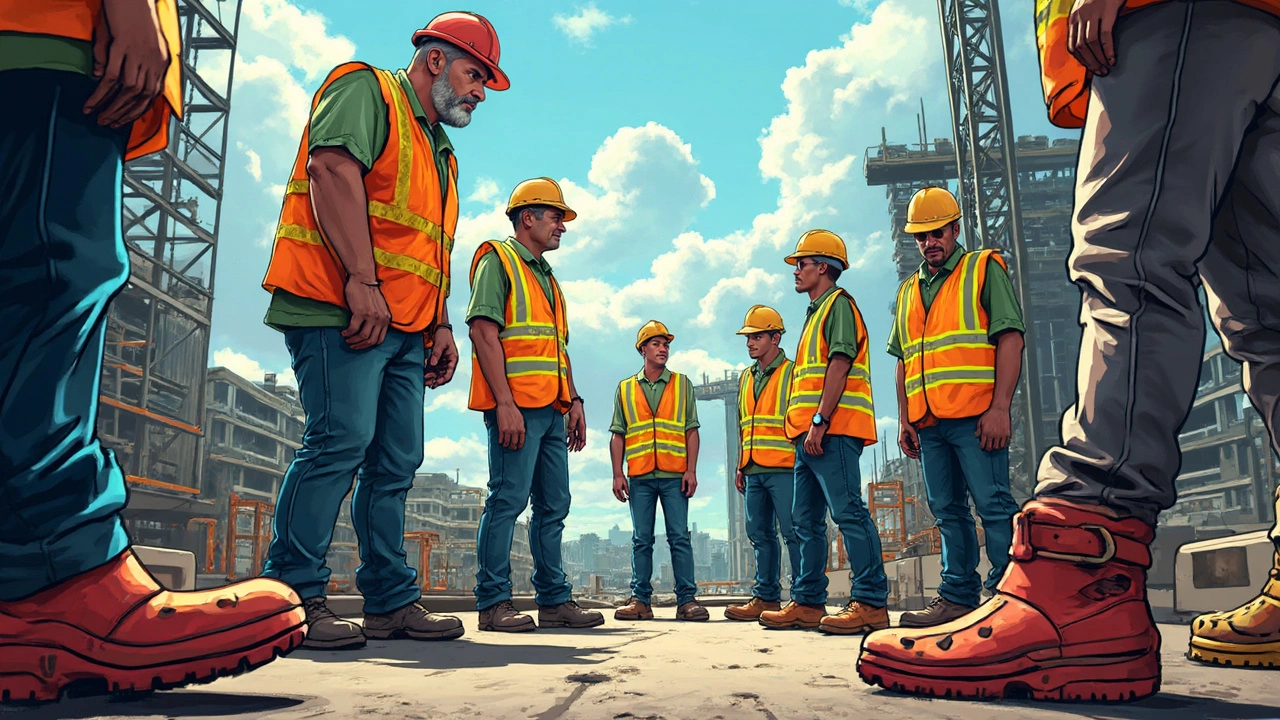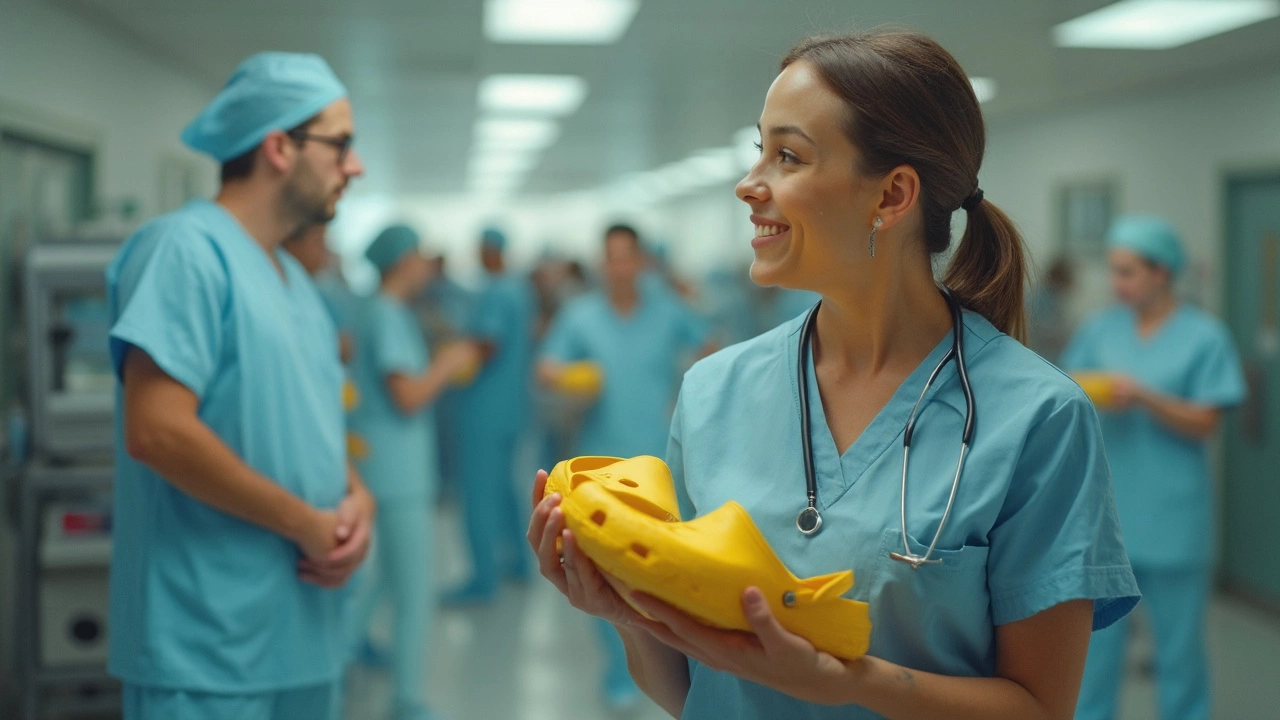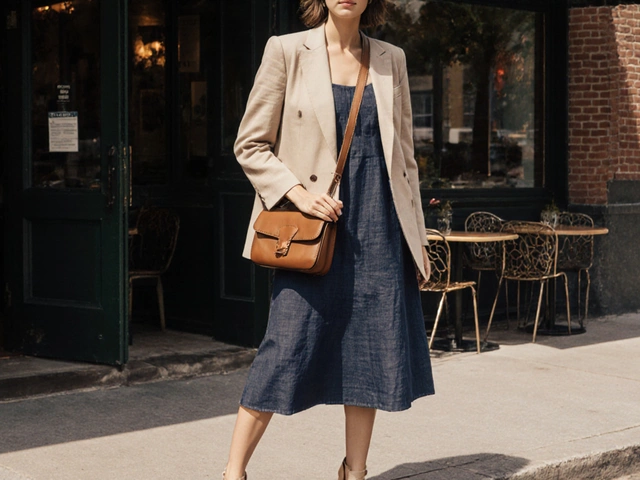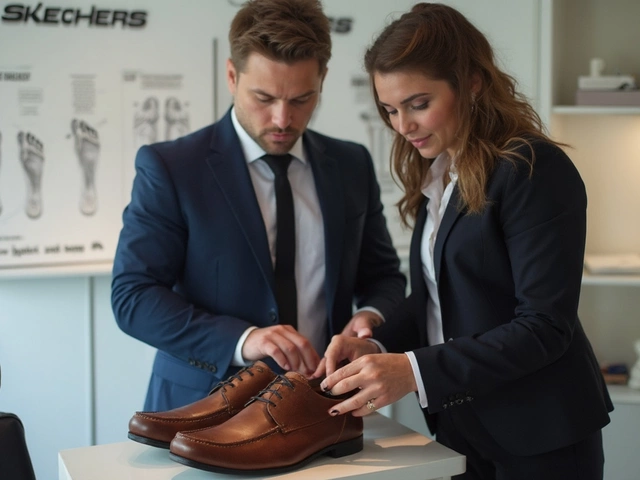Crocs have become a staple in many wardrobes thanks to their comfort and quirky style. But when it comes to workplace attire, are these rubbery wonders crossing the line into health code violations? Let's break it down and see where Crocs stand in various work environments.
Crocs are super popular, right? Their ease and comfort are unmatched, but the workplace isn't just about comfort—safety is a big deal too. In some jobs, especially those with heavy machinery or potential hazards, your go-to casual kicks might not cut it. The open design of classic Crocs, for instance, can raise eyebrows concerning safety protocols.
At the same time, workplaces have codes, often regarding what shoes are acceptable based on the risks involved. Generally, places like hospitals or kitchens might frown upon them due to the risk of spills or falls. So, it's crucial to check if your job has specific guidelines, especially if you're working where safety gear is essential.
- The Popularity of Crocs
- Workplace Safety Concerns
- Health Code Regulations
- Real-Life Examples of Crocs at Work
- Circumstances Where Crocs Are Safe
- Tips for Choosing Work-Appropriate Footwear
The Popularity of Crocs
Let’s talk about why Crocs are everywhere you look. What started as a boat shoe back in 2002 has turned into a global fashion statement embraced by everyone from kids to grandparents. They're quirky, they’re functional, and above all, they’re comfortable. Who would've thought rubber clogs would spark such a frenzy?
One big reason for their popularity is the unique material. It's a foam resin called Croslite, making these shoes super lightweight and easy to clean. And let's be honest, their ventilated design might look odd but does wonders for keeping feet cool in warmer weather. There's also no denying their comfort factor with that roomy fit, so no sore feet at the end of the day—even Whiskers would probably approve!
Appeal Across All Ages
For the kiddos, it's all about ease. Slip them on and off without worrying about tricky laces. Parents love them for that reason too—fewer morning battles trying to get shoes on little feet. Kids’ designs come in every color imaginable and can be jazzed up with Jibbitz charms, making them appealing to their ever-changing tastes.
Grown-ups, on the other hand, dig the practicality and comfort. In a world where we're constantly on our feet, comfort isn't just a perk; it’s essential. And if you've ever worked a grueling shift in comfy shoes, you know it makes all the difference.
| Year | Pairs Sold (millions) |
|---|---|
| 2002 | 0.2 |
| 2010 | 50 |
| 2023 | 103 |
Fad or The Real Deal?
While some write off Crocs as just another fashion trend, the numbers tell a different story. With over 103 million pairs sold in 2023 alone, their staying power is undeniable. Whether for gardening, hospital rounds, or just lounging around the house, these shoes play a big part in everyday life.
In the end, the real kicker is the balance between comfort and style. Despite being mocked as the 'ugly ducklings' of footwear, the comfort factor simply can't be overstated. They’re proof that sometimes the most unlikely items can become cultural icons.
Workplace Safety Concerns
Okay, so your love for Crocs is undeniable, but when it comes to workplaces, safety has to be a priority. Certain aspects of these shoes can bring up red flags, especially in environments with strict workplace safety guidelines.
Slip and Trip Hazards
Crocs are known for their comfy, ventilated design, which is great for letting your feet breathe. But this feature can also be a downside. Open parts of the shoe can easily catch on objects, and because the shoes are loose-fitting, they can slip off easily. For workers dealing with wet or oily floors, like those in kitchens or hospitals, this is a real concern.
Toe Protection
While some Crocs models have closed toes or reinforced areas, the classic styles typically don’t offer much protection against heavy objects. In jobs where you’re always moving things around, or where something could fall on your foot, this lack of protection is a major issue.
Electrical Safety
In professions where you're dealing with electricity, like in construction or IT, wearing non-conductive shoes is critical. Many Crocs styles don’t provide this level of safety, potentially putting you at risk of an electric shock.
Case Studies
It's not just theory—real-life examples back this up. Many hospitals in the USA and UK have reported incidents where Crocs were banned following slip and trip accidents. A few years ago, a major fast-food chain required its employees to stop wearing them due to frequent minor injuries linked to improper footwear.
Employer Guidelines
Most companies have specific dress codes, including footwear requirements, to ensure safety. Employers often prefer shoes with non-slip soles, adequate grip, and toe protection. Understanding these can save you from unwanted accidents.
Health Code Regulations
When it comes to workplace safety, health code regulations are no joke. They're the rules aiming to keep everyone safe and sound on the job. Now, regarding shoes like Crocs, these codes often address a bunch of factors like slip resistance, toes protection, and overall durability.
The main worry about wearing Crocs in some work environments is their open design and the material they're made from. For instance, in restaurants or hospitals, there are rules about footwear needing to be closed-toe and slip-resistant to prevent accidents like spills or equipment drops from causing injuries.
Slip-Resistance Standards
Safety shoes typically need to meet specific slip-resistance standards. This means they should be able to handle greasy floors in kitchens or wet surfaces in healthcare settings. Classic Crocs, which don’t always have non-slip soles, might not be up to the challenge here. That's why checking if your Crocs have the necessary slip-resistant features is crucial before sporting them at work.
Protective Features for Specific Jobs
Some professions have additional requirements. For example, in any job involving heavy objects or machinery, safety shoes might need steel toes or reinforced materials. Clearly, the regular Crocs don't offer that kind of protection, so opting for professional-grade work shoes is often mandatory.
Let's put it this way, health codes aren't just suggestions; they're rules designed to prevent accidents. So, while your Crocs might rock at a barbecue, double-check that they're up to speed with your workplace's unique demands.
| Industry | Footwear Requirement |
|---|---|
| Restaurant | Non-slip, closed-toe |
| Healthcare | Non-slip, closed-toe |
| Construction | Steel-toe, durable material |

Real-Life Examples of Crocs at Work
So, where are Crocs making a splash in the work world? Believe it or not, they’ve got their share of fans and foes in various fields. Let’s explore some real-life workplaces where Crocs have made an appearance.
In the Healthcare Sector
In healthcare, comfort during long shifts is crucial, but safety rules are just as important. Hospitals tend to have strict guidelines, often requiring closed-toe shoes. Yet, some healthcare workers, including nurses and doctors, have been seen wearing versions of Crocs that fit the bill. These models come with extra grip and toe coverings to align with safety protocols.
The Culinary World
Kitchens are another battleground for style versus substance. The non-slip nature of some Crocs is handy on slippery tiles, but open or ventilated designs can be risky with spillages and hot liquids. Some chefs swear by them for their all-day comfort, provided they’re within safety specs—though in more formal kitchens, they’re met with skepticism over image and uniform concerns.
Office Settings
When it comes to more conventional office jobs, Crocs have surprisingly snuck their way into casual Fridays and work-from-home days. Sure, they’re not your typical formal attire but offer a cozy respite that remote workers favor.
Construction and Manufacturing
Crocs are generally a no-go here. The risk of injury from dropping heavy objects or machinery makes steel-toed, closed shoes the standard requirement. However, newer models with reinforced materials are starting to gain some traction in less hazardous roles.
Retail and Customer Service
Employees who spend all day on their feet, like retail workers, often search for comfy footwear options. While Crocs are popular, policies typically dictate something a bit more traditional, though exceptions exist for certain styles that meet sneaky safety checks.
Overall, while Crocs might pass muster in some settings, it’s always best to check company footwear policies. Deviating from these could land you in hot water, not just because of safety concerns but also to maintain a professional appearance.
Circumstances Where Crocs Are Safe
Despite some workplaces having strict rules, there are still plenty of places where having a pair of Crocs is perfectly fine, or even advantageous. Their lightweight, comfortable, and easy-to-clean nature make them appealing for many environments.
Office Environments
In more relaxed office settings, where the risk of injury is minimal, these popular clogs might be just fine. If the dress code is business casual, consider opting for a pair of Crocs that mimic the look of loafers or more conventional shoes. This blend of style and comfort often fits office attire nicely without breaking any workplace safety codes.
Healthcare Settings
Although some hospitals have reservations, Crocs with closed toes and a secure fit are a hit among healthcare workers, especially in non-sterile areas. They're easy to disinfect, which is huge in healthcare. Many health code guidelines allow such variants because they maintain a slip-resistant, cushioned support benefitting long hours on foot.
Outdoor and Recreational Activities
If your work involves outdoor tasks where weather conditions are unpredictable but hazards are minimal, Crocs are a safe bet. Wearing them while gardening or doing light maintenance jobs is a great way to keep your feet comfy and dry, thanks to their water-resistant nature.
Service and Hospitality Settings
Depending on the specific role and its risk factors, Crocs can be suitable in these settings, with numerous restaurants allowing them for quick tasks thanks to their grip and comfort. They can be especially practical in fast food or temporary event setups, as long as they are anti-slip and meet safety norms.
| Environment | Crocs Compatibility |
|---|---|
| Office | Generally Allowed |
| Healthcare | Allowed in Non-Sterile Areas |
| Outdoor | Allowed |
| Service/Hospitality | Depends on Role |
Before slipping on those comfy Crocs for work, check with your organization's dress code details or with your safety officer if there are variances to follow. Ultimately, the goal is to enjoy their benefits while ticking all safety boxes.
Tips for Choosing Work-Appropriate Footwear
Selecting the right shoes for work isn't just about matching your outfit; it's about keeping safe and comfy too. Different jobs have different needs, so let's look at some practical tips for picking work shoes that tick all the boxes.
Know Your Work's Requirements
First off, check your workplace's guidelines. Many workplaces have specific rules regarding footwear. For example, hospitals might require closed-toe shoes, while construction sites often demand steel-toed boots.
Prioritize Safety and Comfort
Look for shoes that offer both safety and comfort. If your job involves a lot of standing or walking, cushioned soles or insoles help reduce fatigue. And if there's a risk of dropping heavy objects, opt for reinforced toes.
- Check for anti-slip soles if spills are common in your job environment; they can help prevent falls.
- Consider supportive arches if you’re on your feet all day to minimize foot pain.
Material Matters
Choose materials based on your work environment. In wet or greasy areas, water-resistant materials are crucial. If your job involves potential fire hazards, opt for non-synthetic materials that resist melting.
Proper Fit is Key
Ill-fitting shoes can cause blisters or long-term foot problems. Work shoes should fit snugly but comfortably, with enough room for your toes to wiggle.
Style, Within Reason
While style isn't everything, finding a shoe that suits both your fashion sense and workplace demands is ideal. Remember, work shoes need to meet safety standards first!
Investing in the right footwear not only helps in maintaining safety but also boosts productivity by keeping you comfortable throughout your workday. So next time you're out shoe shopping, keep these tips in mind, and choose wisely!





